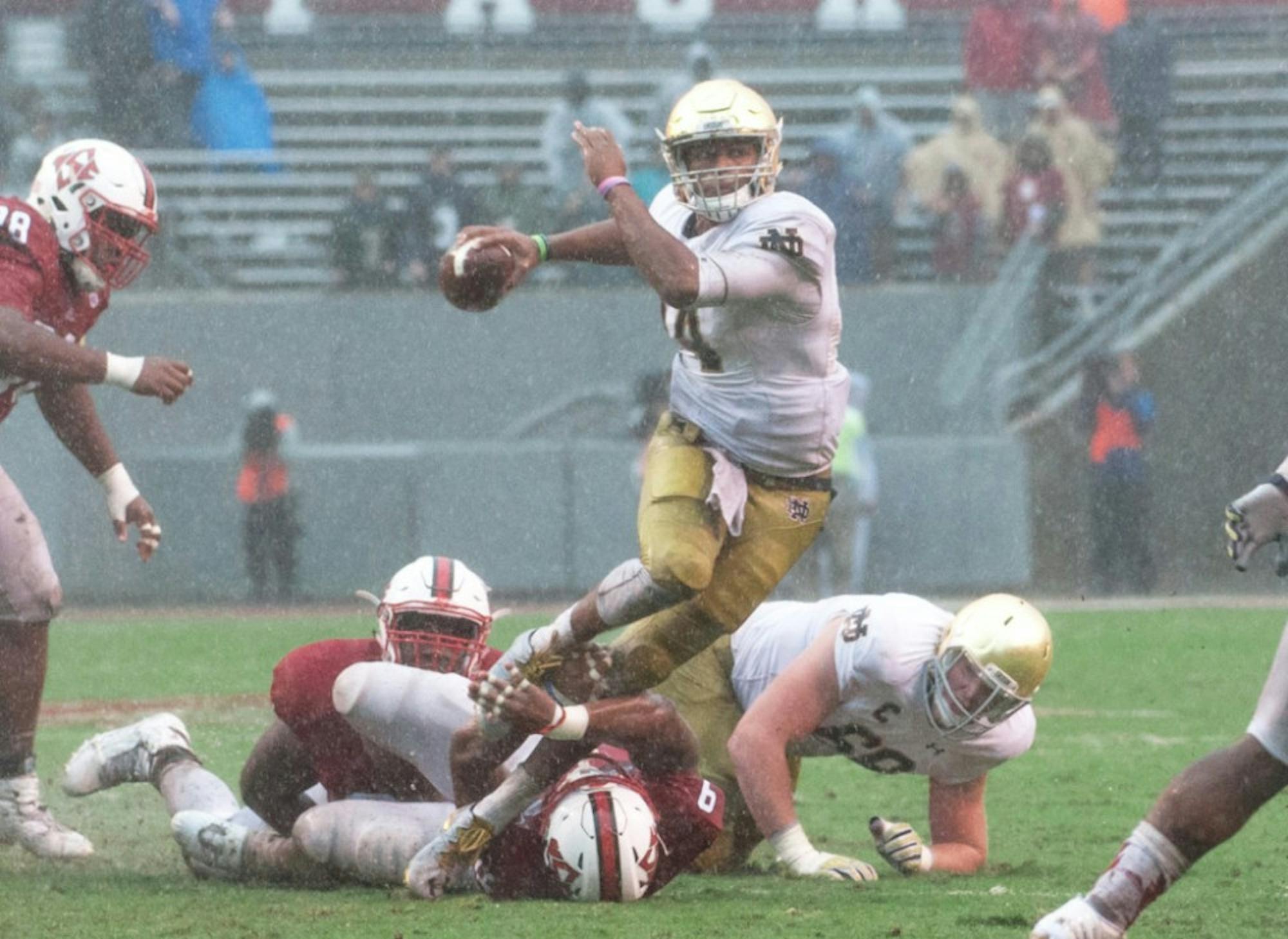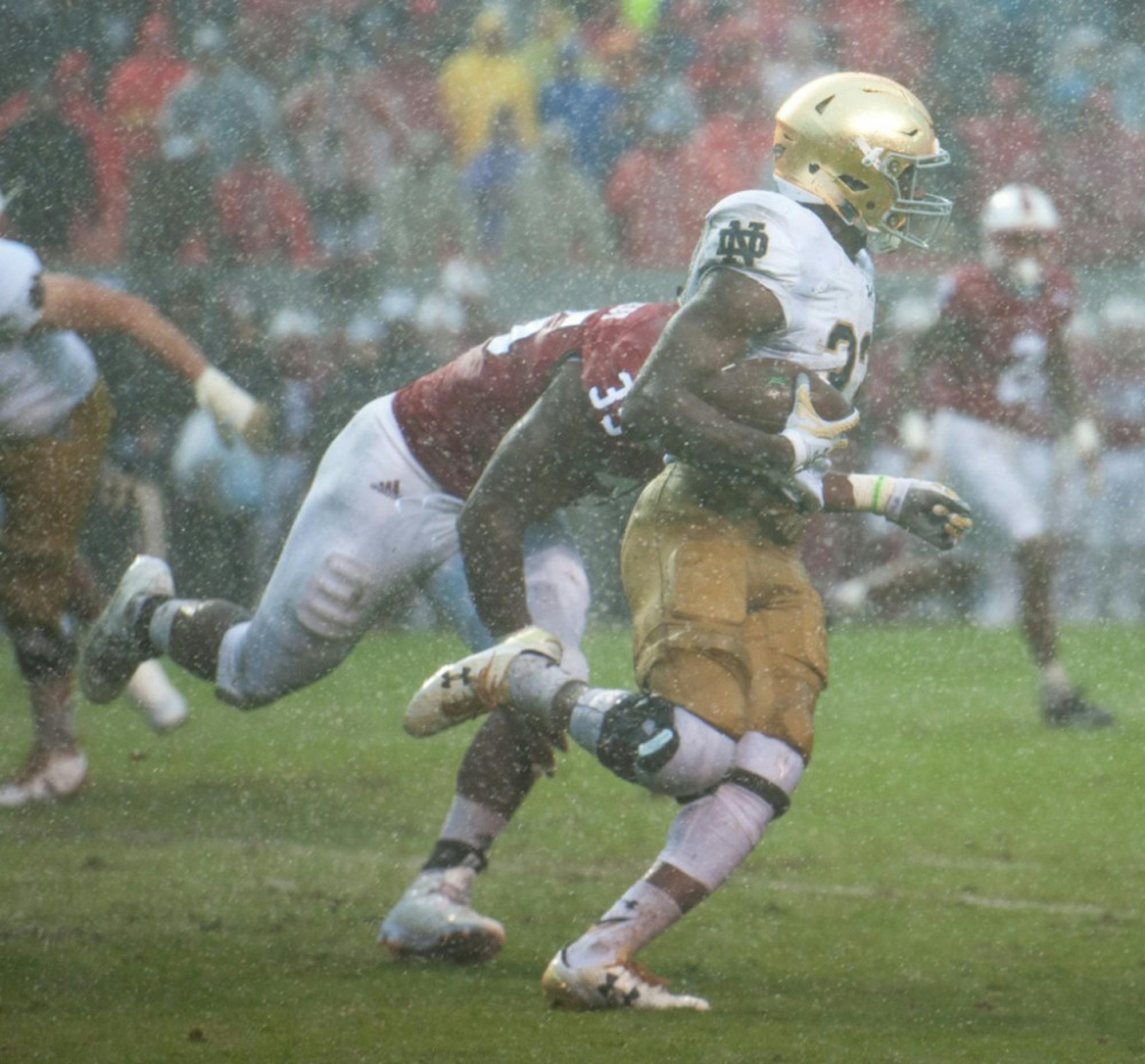RALEIGH, N.C. — While Hurricane Matthew battered Raleigh, North Carolina, on Saturday, at the end of the day both North Carolina State and Notre Dame headed to the locker room dripping wet and covered in mud; the Wolf Pack perhaps more so after players took celebratory slides across the Carter-Finley Stadium grass — or lake, more accurately.
“[The offense] was sloppy, and when it’s sloppy like that there’s no room for error,” Irish senior offensive lineman Mike McGlinchey said after the game. “And we had to tighten it up a little bit and I think we did that on the last drive. Unfortunately we fell short, but that’s the way football is.”
Now Notre Dame (2-4) is staring at the strong possibility of 5-7 season with three games remaining against ranked opponents still seeking answers.
The only answer found in Saturday’s debacle in Hurricane Matthew was confusion.
Confusion first at why the game was even played — but that’s another story.
Confusion caused by the brief delay to start the second half, or when the game would be finished, if at all.
And, most of all, confusion from Irish fans at Notre Dame’s offensive play calling.
The questions started on the first series of the game when the Irish, staring directly into Matthew’s windy and rainy teeth, chose to throw the ball on three straight plays. They went three-and-out.

By halftime, junior quarterback DeShone Kizer was 6-of-14 for just 38 yards and an interception. The pick came on a second quarter drive that started at N.C. State’s 22-yard line, a drive where Kizer threw the ball five times, completing one, before his sixth attempt was intercepted at the goal line.
The Irish ran the ball once.
“No, I don’t think I would second guess [calling so many pass plays],” Irish head coach Brian Kelly said. “We still had 38 carries. I think it was pretty evident to me that we were in need of throwing the football when we did throw it. We just weren’t as effective as we could be.
“With the defense that North Carolina State was playing against us, they were putting an extra guy in the box,” Kizer said. “The safety was dropping in, they were throwing some blitzes at us. The best way to combat that is to throw the football. And we stayed true to who we are, and that’s to go out there and take what the defense gives us and tonight it was throwing the ball. We just weren’t able to do that well.”
At the end of the first half, Notre Dame had officially amassed just 12 yards on 10 carries. Statistics can be misleading, though: two of those “rushes” were bad snaps that combined for a loss of 10 yards and a fumble, and a third was an eight-yard sack.
So at the end of the first half, Notre Dame had intentionally run the ball seven times for 30 yards. In other words, the Irish were averaging 4.3 yards per carry.
The passing game, on the other hand, was having more troubles than just Hurricane Matthew: Kizer wasn’t as sharp as he’s been this season, and the Irish receivers couldn’t break free.
Senior receiver Torii Hunter Jr. said the footing was “actually pretty good,” but added that he didn’t think the Wolfpack secondary locked down the Irish receiving corps.
Yet Kizer still found himself without anywhere to throw the football. The Wolfpack defense sacked him five times and hurried him three more in addition to forcing many short scrambles that gained just a yard or two. Kizer continually had to throw into small windows, and the Wolfpack secondary broke up six of his passes. He completed just four of his final 20 pass attempts — including a string of 10 consecutive incompletions — and one of those four completions was his desperation flip after the bad snap on Notre Dame’s final offensive play that was snagged illegally by McGlinchey but allowed to stand because N.C. State declined the penalty to force the turnover on downs.By the time the Irish started running the ball, it was Notre Dame’s final drive of the game. The Irish ran the ball 11 times on the first 14 plays of their final drive, moving to the N.C. State 19 yard-line.

“I trust the guys upstairs. Our coaching staff knows exactly what they want, what they’re looking for, and those plays came in perfect,” Kizer said. “They were all capable of making big plays, but the conditions got the best of us on a couple of them.”
“You second guess yourself in games like this where your team is ready to play and excited to play,” Kelly said.
Kelly said the Irish came in with the expectation of throwing the football regardless of what Matthew threw at them. It was a game plan the Irish didn’t waver from until it was too late.













